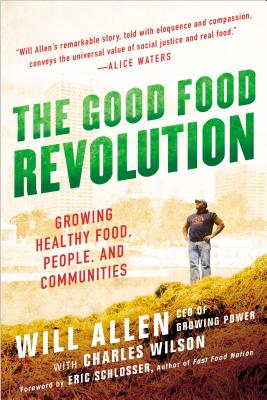Jack Covert Selects - The Good Food Revolution
May 10, 2012
The Good Food Revolution: Growing Healthy Food, People, and Communities by Will Allen, Gotham Books, 272 pages, $26. 00, Hardcover, May 2012, ISBN 9781592407101 For an average-sized book, there is a lot within this one. From the title, one might expect sociological research on trends in organic food, or an analysis of a health food business and how they became successful.
The Good Food Revolution: Growing Healthy Food, People, and Communities by Will Allen, Gotham Books, 272 pages, $26.00, Hardcover, May 2012, ISBN 9781592407101
For an average-sized book, there is a lot within this one. From the title, one might expect sociological research on trends in organic food, or an analysis of a health food business and how they became successful. While it certainly has traces of those things, it is so much more.
This book is by and about a man named Will Allen, who grew up around farming, played professional basketball, managed a chain of restaurants, was an executive for Proctor & Gamble, battled cancer and a lot of discrimination and racism along the way, and returned to his life's passion and roots in farming to help the health, economy, and lives of many people.
During Allen's succession of career changes, from Disco owner to P&G exec, he was continuously involved in farming, from his back yard garden, to starting a farmer's market co-op, to eventually buying a number of greenhouses and forming the company Growing Power, which is now a leader in the field of urban agriculture. Growing Power grows and sells produce, fish, and eggs locally, and educates others on its processes. It teaches people and businesses how to grow their own food, and how to grow it better than what's commonly available in stores. Speaking to the importance of that work, Allen states:
If we are to make farming a profession that young people want to enter, we need to create new models for growing and distributing food that are both emotionally satisfying and economically viable. We have to be guided by the principle that small is beautiful.And as convenience continues to propel businesses such as fast food restaurants and corner stores forward, the quality of food and our health is at stake. Again, Allen focuses on young people:
Our current generation of young people rarely eat fresh foods, don't know how to grow or prepare them, and in many cases, can't even identify them. They have become entirely dependent on a food system that is harming them.
I believe that equal access to healthy, affordable food should be a civil right—every bit as important as access to clean air, clean water, or the right to vote. The Good Food Revolution is the kind of book you just can't put down, rich with personal stories, and full of insightful lessons about business and life that transcend the food industry. There are fundamental lessons in Allen's work that all leaders can learn from. Certainly, we can't all grow food, but every leader can look at their business for the true human value that exists within it, and think about ways to spread that quality for the benefit of others.



